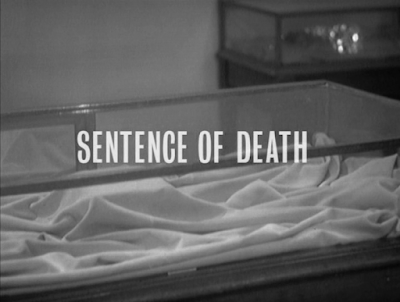Saturday 27th June 1964 - Doctor Who - The Unwilling Warriors
"We're very dependant on the Doctor. He leads and we follow."
Essentially
The Sensorites communicate telepathically through Susan and finally meet the Doctor and others face to face. The Doctor works out that it's all about the metal Molybdenum. Susan is taken down to the Sense Sphere.
Reactions and Thoughts
After watching this episode, I'm not sure who the "unwilling warriors" actually are. The Sensorites who come on board, striking fear or Ian who wields a wrentch threateningly? Or Barbara and Susan who send a telepathic message that they won't comply? Or all of them? It's a small point but left me puzzled.
I'm starting to notice two things about the show so far. One, that most of the stories involve being prevented from getting into the TARDIS. Two, that plot points frequently involve characters being trapped behind doors of some sort. Last episode ended with Barbara and Susan trapped behind one of the spaceship's large round doors and this week's episode ends with Susan being taken behind one of the spaceship's large round doors down to the nearby planet.
What's good about the start is the way that that eerie Sensorite floating outside the spaceship's window continues to help build a fear of Sensorites as something alien. We see them fully - briefly - after 5 minutes. They have very thin, circular feet.
The Doctor is concened that his human companions give into fear (of the alien) in the way that Maitland, Carol and Joe have become. He repeatedly tells Ian to maintain control: "Try and contain your emotions. Use self-control. Otherwise it confuses the brain and leaves it wide open to an attack by the Sensorites." The deranged John tells Barbara and Susan something similar, realising how the Sensorites have used hs fear of them to control him.
Susan tells Barbara about the Planet Esto, on an adventure before Totters Lane:
SUSAN: Grandfather and I landed on a planet once called Esto. The plants there used thought transference. If you stood in between two of the plants, they set up a sort of screeching noise. Grandfather said it was because they were aware of another mind.
Their plan is to think of something at the same time ("We defy you"). It seems to work - and hurts the Sensorites. But it also causes Susan to collapse.
The Sensorites use a handheld device to read minds. I'm not quite sure if this is to aid their natural mode of communication as they show that they can actually speak.
The Doctor does a great deal of detective work this episode. He deduces that the Sense Sphere has valuable Molybdenum (and, helpfully tells us that it's an alloy used in steel-making. He correctly suspects that the Sensorites have held the humans and their spaceship because of this; they don't want their Molybdenum stolen.
Susan and Barbara have an exchange about their travels with Carol who is bemused by the TARDIS' companions:
CAROL: You're very strange people.
SUSAN: Are we?
CAROL: Well, you've come from nowhere and you seem to be going nowhere.
BARBARA: We're very dependant on the Doctor. He leads and we follow.
CAROL: Travel without a purpose?
BARBARA: Oh, no, there's a purpose in it. He's trying to get us back to our own time. On Earth.
CAROL: Oh, I see.
SUSAN: Isn't' it a better thing to travel hopefully than arrive?
After Maitland and X are struck down by telepathic thoughts, Barbara and Ian go off in search of the Sensorites on the ship. Search corridors. When they encounter the Sensorites, Ian grabs a wrench and is cornered. Once again, we start to see a more violent side to Ian that appears to be developing:
BARBARA: Ian, no.
IAN: Why not? How else can I keep these creatures off?
BARBARA: Well, do you need to keep them off? Have they actually attacked you? Come on, John. Lock the door.
(John waves his hand in front of a lower electric eye)
JOHN: They can't open now.
BARBARA: It's strange they didn't harm you.
JOHN: No.
IAN: I think they were as frightened of me as I was of them.
BARBARA: They're not very aggressive, are they.
IAN: No.
Susan becomes the telepathic means of communication between the Sensorites and the others (even though the Sensorites seem to be quite able to talk). Is this used in order to set up the cliffhanger?
More detective work by The Doctor: he deduces that the Sensorites have eyes that are dilated and that they would be frightened of the dark. It's a leap.
This week's cliffhanger is the surprise that Susan has secretly agreed to go down to the Sense Sphere with the Sensorites so that the others aren't hurt. (And everyone seems too shocked to physically stop her!)
After All is Said and Done
It starts well with the continued build-up of tension to the meeting with the Sensorites. Much of the episode, however, seems a lot of waiting around. Susan has played more of a role in this episode than usual.
Next episode: Hidden Danger



























